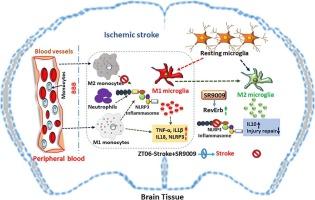混响激动剂 SR9009 对小鼠中风梗塞体积的缩小与时间有关。
IF 4.2
2区 医学
Q1 NEUROSCIENCES
引用次数: 0
摘要
缺血性中风在全世界导致残疾和死亡,有证据表明,中风的严重程度受中风时间维度的影响。Rev-Erbα 通过抑制正时钟元件 Bmal1 来调节核心昼夜节律时钟。然而,Rev-Erbα激动剂(SR9009)是否能减轻小鼠中风的病理变化仍不清楚。我们发现,中风会降低 Rev-Erbα 的水平,并在中风时间(ZT)ZT06 升高神经炎症和中风的严重程度。因此,我们假设 SR9009 治疗可在小鼠缝合闭塞模型中减轻神经炎症和中风严重程度。12-14 周时,C57BL/6 J(野生型,n = 5-10 小鼠/组)小鼠被随机分配在缝合时间 ZT06(MCAO-ZT06-睡眠期)或 ZT18(MCAO-ZT18-清醒期)接受 60 分钟的 MCAO 中风。在 MCAO 后 1 小时和 24 小时,用 SR9009(100 毫克/千克)或药物治疗中风小鼠。中风 48 小时后,进行 TTC 染色、Western 印迹和 qRT-PCR 检测。我们发现,SR9009 可通过 Rev-Erb 重塑缓解 ZT06 中风小鼠的神经炎症和梗死体积,但对 ZT18 中风小鼠无效。此外,在 ZT06 中风小鼠中,SR9009 治疗可降低单核细胞和中性粒细胞 NLRP3 以及脑 NLRP3 水平,但在 ZT18 中风小鼠中未观察到影响。SR9009 还降低了 ZT06 中风小鼠血液和大脑中 TNFα 的表达,增加了 IL-10 的表达,但在 ZT18 中风时未观察到差异。在ZT06和ZT18的48小时内,SR9009对神经功能缺损评分和感觉运动功能没有明显影响。我们的研究表明,SR9009治疗可减少中风量、循环免疫反应和昼夜节律表达,而且其保护作用与昼夜节律和治疗时间有关。本文章由计算机程序翻译,如有差异,请以英文原文为准。

Time of day dependent reduction in stroke infarct volume by the Reverb agonist SR9009 in mice
Ischemic stroke leads to disability and death worldwide and evidence suggests that stroke severity is affected by the time dimension of the stroke. Rev-Erbα regulates the core circadian clock through repression of the positive clock element Bmal1. However, it remains unclear if a Rev-Erbα agonist (SR9009) alleviates stroke pathology in mice. We found that stroke reduces the level of Rev-Erbα and elevates neuroinflammation and stroke severity at zeitgeber time (ZT) ZT06. Therefore, we hypothesized that SR9009 treatment may reduce neuroinflammation and stroke severity in a mouse suture occlusion model. At 12 to 14 weeks, C57BL/6 J (Wild Type, n = 5–10 mice/group) mice were randomly assigned to undergo MCAO stroke for 60 min at either zeitgeber time ZT06 (MCAO-ZT06-sleep phase) or ZT18 (MCAO-ZT18-awake phase). Stroked mice were treated with SR9009 (100 mg/kg) or vehicle at 1 h and 24 h after MCAO. After forty-eight hours of stroke, TTC staining, Western blot, and qRT-PCR were performed. We found that SR9009 treatment alleviates neuroinflammation and infarct volume by Rev-Erb remodeling in ZT06 stroke mice but not in ZT18 stroke mice. Additionally, monocytic and neutrophilic NLRP3 as well as brain NLRP3 levels were reduced by SR9009 treatment in ZT06 stroke though no effects were observed at ZT18 stroke. SR9009 also reduced TNFα expression and increased IL-10 expression in blood and brain in ZT06 stroke mice and no differences were observed at ZT18. There were no significant effects of SR9009 on neurological deficit score and sensorimotor function at ZT06 or ZT18 at 48 h. Our study demonstrates that SR9009 treatment reduces stroke volume, circulating immune response, circadian expression, and that the protection was circadian- and treatment time-dependent.
求助全文
通过发布文献求助,成功后即可免费获取论文全文。
去求助
来源期刊

Experimental Neurology
医学-神经科学
CiteScore
10.10
自引率
3.80%
发文量
258
审稿时长
42 days
期刊介绍:
Experimental Neurology, a Journal of Neuroscience Research, publishes original research in neuroscience with a particular emphasis on novel findings in neural development, regeneration, plasticity and transplantation. The journal has focused on research concerning basic mechanisms underlying neurological disorders.
 求助内容:
求助内容: 应助结果提醒方式:
应助结果提醒方式:


